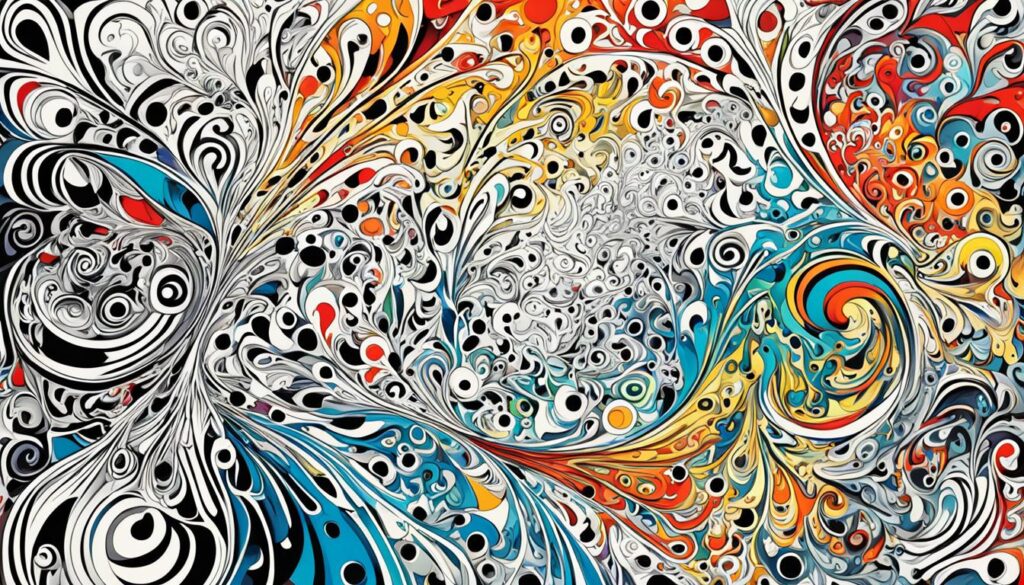Many think schizophrenia means seeing or hearing things that aren’t there. But, it’s important to know not everyone with schizophrenia sees or hears things. Studies show that about 70% of people with schizophrenia hear sounds that others don’t. This shows how different each person’s experience can be.
This article will clear up wrong ideas about schizophrenia. It will show that hearing voices is not the only symptom. For example, a study in 2016 found that almost 80% of people with schizophrenia heard sounds others didn’t. But, this doesn’t tell the whole story of schizophrenia.
Key Takeaways
- Hallucinations are a common symptom in schizophrenia but not experienced by all individuals.
- About 70% of individuals with schizophrenia report experiencing hallucinations.
- Understanding schizophrenia requires looking beyond hallucinations to other symptoms.
- Recent studies demonstrate a range of sensory experiences among those diagnosed.
- The presence of hallucinations can vary significantly from person to person.
Understanding Schizophrenia: An Overview
Schizophrenia is a complex mental health disorder that affects less than one percent of people in the U.S. It’s a condition that can change how someone thinks, behaves, and feels. The Schizophrenia Overview explains its various symptoms.
This condition includes symptoms like delusions, feeling emotionally flat, and cognitive challenges. These symptoms usually start in early adulthood, often in late teens to early 20s for men and a bit later for women. To be diagnosed, these symptoms must last for at least six months.
Studies show that schizophrenia affects men and women equally. However, men tend to show symptoms earlier. People with schizophrenia are more likely to have other health problems, which can shorten their lives. It’s important to spot early signs, as they often come before a psychotic episode.
One key feature of schizophrenia is anosognosia, where people don’t realize they have the condition. This can make it hard for them to follow treatment and manage their symptoms. But, with the right treatment, many people with schizophrenia can live fulfilling lives.
| Aspect | Details |
|---|---|
| Population Affected | Less than 1% in the U.S. |
| Onset of Symptoms | Late teens to early 20s for men, early 20s to early 30s for women |
| Diagnostic Criteria | Symptoms must persist for at least 6 months |
| Co-occurring Conditions | Higher rates of heart disease and diabetes |
| Initial Psychotic Episode | Usually diagnosed between ages 16 and 30 |
| Awareness of Disorder | Anosognosia leads to poorer outcomes |
Defining Hallucinations in Schizophrenia
Hallucinations are a key symptom of schizophrenia. They are disturbances in how we see, hear, touch, taste, smell, or feel things. People with hallucinations see or hear things that aren’t there. This can make their reality different from what others see or hear.
It’s important to know the different kinds of hallucinations to understand schizophrenia better.
Types of Hallucinations
About 75% of people with schizophrenia hear voices or sounds that aren’t there. This is the most common type of hallucination. Some may see things that aren’t there, like objects or people. There are also less common types, such as:
- Gustatory hallucinations, often experienced as unusual tastes, particularly a metallic flavor.
- Olfactory hallucinations, which may involve detecting smells that are not present.
- Tactile hallucinations that create sensations of touch or movement on the body.
- Hypnagogic hallucinations watched during the transition to sleep.
Not everyone with schizophrenia has the same hallucinations. This shows how different each person’s experience can be.
Common Misconceptions
There are many wrong ideas about schizophrenia. One wrong idea is that everyone with schizophrenia sees or hears things that aren’t there. But not everyone does. Some might have hallucinations from other mental health issues.
It can be hard to tell hallucinations from other symptoms of schizophrenia. This can lead to confusion. Teaching people the truth can help clear up these myths. This way, we can better understand what people with schizophrenia go through.
Hallucinations Not Always Present? Understanding Schizophrenia
Many people think that schizophrenia means seeing or hearing things that aren’t there. But that’s not always true. Not everyone with schizophrenia sees or hears things that aren’t real. The DSM-5 says a person must have at least two of five specific symptoms to be diagnosed with schizophrenia. These symptoms include hallucinations, delusions, and more.
This shows that schizophrenia is a complex condition. Not everyone with it will see or hear things that aren’t there. Some might have trouble moving or speaking in a way that makes sense. The DSM-5 also changed how it groups symptoms, showing that not all schizophrenia cases involve hallucinations.
About 80 percent of people with schizophrenia do hear or see things that aren’t there. Many experience symptoms in more than one sense. This shows we need to understand schizophrenia better to help those who have it. Treatment plans should be made with care, especially for those who don’t see or hear things that aren’t there. They might not need certain medications.
| Schizophrenia Symptoms | Occurrence (%) | Details |
|---|---|---|
| Hallucinations | 80 | Commonly auditory; can affect multiple senses. |
| Delusions | Varies | False beliefs often held despite contradictory evidence. |
| Disorganized Behavior | Varies | Chaotic responses to situations that can disrupt daily life. |
| Negative Symptoms | Varies | Involves reduced emotional expression, lack of motivation. |
The Prevalence of Hallucinations in Schizophrenia
Understanding hallucinations in schizophrenia is crucial. They affect many people, especially with auditory hallucinations. Statistics on schizophrenia show that 60% to 80% of those with the disorder hear voices.
Statistics on Hallucination Occurrence
Studies reveal interesting facts about hallucinations in schizophrenia. For example, over 70% of patients hear voices. These hallucinations are linked to cognitive issues.
Patients with frequent hallucinations often struggle in tests that require listening to sounds from both ears. This suggests they have perceptual problems.
Differences Among Individuals
Each person with schizophrenia experiences hallucinations differently. Their cognitive skills and brain structure play a big role. Studies show that the left temporal lobe in the brain is less dense in those who hallucinate.
This shows that hallucinations are common but affect people in unique ways.
Understanding hallucinations in schizophrenia helps us grasp this complex condition better.
Types of Symptoms in Schizophrenia
Understanding the different symptoms of schizophrenia is key to helping those affected. The condition has three main types of symptoms: positive, negative, and disorganized. Each type shows a different way the condition affects people, helping us understand their experiences better.
Positive Symptoms
Positive symptoms mean too much of normal functions. People may hear voices or believe things that aren’t true. These symptoms can make daily life hard and hurt relationships. They can also cause a lot of emotional pain, making it hard for people to cope.
Negative Symptoms
Negative symptoms mean a lack of normal feelings and actions. People might not want to do things, avoid others, or show emotions. These signs can show up early and make it hard to take care of oneself or keep relationships. It’s important to know these signs because they can warn of schizophrenia.
Disorganized Symptoms
Disorganized symptoms mess with thinking and actions. People might have trouble speaking clearly or staying focused. This can make everyday tasks hard and make it tough to follow conversations. Knowing about these symptoms helps us understand the full picture of schizophrenia and its effects.
For more insights into managing symptoms related to anxiety, refer to this link.
| Type of Symptom | Characteristics |
|---|---|
| Positive Symptoms | Hallucinations, delusions, exaggerated perceptions |
| Negative Symptoms | Lack of motivation, social withdrawal, emotional flatness |
| Disorganized Symptoms | Confused speech, erratic thinking, difficulty concentrating |
How Hallucinations Manifest
People with schizophrenia may experience hallucinations in different ways. These can affect how they see and act. This part will look at the main types of hallucinations, like hearing and seeing things that aren’t there, and some less common ones.
Auditory Hallucinations
About 60% to 80% of those with schizophrenia hear voices. These voices might tell them what to do, comment on things, or talk to them. Hearing these voices can change their behavior, make them feel bad, and make everyday tasks hard.
Visual Hallucinations
Visual hallucinations happen in 16% to 72% of people with schizophrenia. They see things that aren’t really there, like images or shadows. These can be simple or very detailed, making life harder for them.
Less Common Types
Some people with schizophrenia also have olfactory, gustatory, and tactile hallucinations. Olfactory hallucinations make them smell things that aren’t there, affecting about 19% to 27%. Gustatory hallucinations make them taste things that aren’t there, happening to 8.5% to 14.4%. Tactile hallucinations make them feel touch that isn’t there, felt by 22% to 27%.

| Type of Hallucination | Prevalence |
|---|---|
| Auditory Hallucinations | 60% to 80% |
| Visual Hallucinations | 16% to 72% |
| Olfactory Hallucinations | 19% to 27% |
| Gustatory Hallucinations | 8.5% to 14.4% |
| Tactile Hallucinations | 22% to 27% |
Diagnosis of Schizophrenia
Diagnosing schizophrenia is a careful process that looks at many factors. Mental health experts use Diagnosis Criteria to help make a diagnosis. To get a Schizophrenia Diagnosis, a person must show at least two main symptoms for over a month. These symptoms must be severe enough to last for six months.
Criteria for Diagnosis
The DSM-5 sets out the symptoms to look for:
- Delusions
- Hallucinations
- Disorganized speech
- Catatonic behavior
- Reduced ability to function in daily life
To diagnose, doctors do a physical check-up, review your medical history, and might run tests like MRI scans or blood tests. These steps are key to telling schizophrenia apart from other mental health issues.
Role of Mental Health Professionals
Mental Health Professionals in Schizophrenia diagnosis are crucial. They do detailed interviews and mental exams to get all the facts. This helps them figure out the best treatment plan and spot other conditions that might affect the diagnosis.
Knowing the Diagnosis Criteria and the role of experts helps people with schizophrenia get the right support. With the right care, those diagnosed can manage their condition better.
| Symptom | Duration for Diagnosis |
|---|---|
| Delusions | At least 1 month |
| Hallucinations | At least 1 month |
| Disorganized Speech | At least 1 month |
| Catatonic behavior | At least 1 month |
| Reduced Functionality | Presence for 6 months |
Possible Causes of Hallucinations in Schizophrenia
Exploring the Causes of Hallucinations in schizophrenia shows us the complex mix of brain chemistry and psychological factors. The role of neurotransmitters, especially dopamine, is key in causing hallucinations. Psychological factors also play a big part in how intense and frequent these experiences are. Understanding these factors helps us see the depth of schizophrenia.
Brain Chemistry and Hallucinations
Brain Chemistry in Schizophrenia is closely linked to hallucinations. High dopamine levels in certain brain areas are often seen with hallucinations and delusions. Studies using brain scans show differences in brain areas of those with hallucinations versus those without. For example, the left temporal area is more active during hallucinations.
- Dopamine: High levels lead to enhanced experiences of hallucinations.
- Glutamate: Antagonists like phencyclidine can induce hallucinations, highlighting its potential role.
- Serotonin: Some hallucinogenic substances act as serotonin receptor agonists, implicating serotonin in hallucination causation.
- GABA: Diminished binding in the left medial temporal region is noted in association with hallucinations.
Psychological Factors
Psychological Factors in Schizophrenia greatly affect how and when hallucinations happen. Stress, past trauma, and mental health can make hallucinations worse. People with more anxiety or feeling isolated might hear voices more often. The content of hallucinations also shows the person’s feelings and past experiences.
“Hallucinations can often be understood as a reflection of psychodynamic significance, intertwining with the individual’s past and stressors.”
| Neurotransmitter | Effect on Hallucinations |
|---|---|
| Dopamine | Increased levels contribute to hallucinations and delusions. |
| Glutamate | Antagonists can induce hallucinations, suggesting its role in perceptual disturbances. |
| Serotonin | Influences hallucination experiences through receptor pathways. |
| GABA | Diminished binding is linked to hallucinations in specific brain regions. |
The Impact of Schizophrenia on Daily Life
Schizophrenia deeply affects daily life, impacting health, social interactions, and work. Many people with schizophrenia face social challenges due to misconceptions and stigma. This leads to isolation, making it hard to form relationships and participate in community events.
Social and Occupational Challenges
People with schizophrenia face big social hurdles. Many are stigmatized, leading to a lack of understanding in the community. This makes it hard to find and keep a job, as employers may not know about the condition. Feeling lonely and struggling to connect with others can make symptoms worse.
- Difficulty in forming and sustaining relationships
- Challenges in finding and keeping jobs
- Increased risk of social withdrawal
- Heightened vulnerability to mental health crises
Workplaces often don’t have enough support for employees with schizophrenia. But, support systems are key to overcoming these issues. Being part of a supportive network can make someone feel included and understood.
The Role of Support Systems
Support systems for schizophrenia include many types of help important for recovery. Family, friends, and professionals all play a big part in someone’s well-being. They offer emotional support and practical help.
| Type of Support | Benefits |
|---|---|
| Family Therapy | Improves communication and understanding among family members |
| Support Groups | Provides shared experiences and strategies for coping |
| Crisis Services | Offers immediate assistance and resources during emergencies |
| Community Programs | Enhances life skills and fosters social connections |
Being part of these support networks can really change how schizophrenia affects daily life. It helps with recovery and makes facing social challenges easier. Knowing how important these systems are can lead to better ways to manage the condition and improve life quality.
Exploring Schizophrenia Treatment Options
People with schizophrenia get help from many treatment options. These options cover both their mental and physical health needs. A good treatment plan usually includes Medications for Schizophrenia and Psychotherapy for Schizophrenia. This mix helps improve life quality and overall well-being.
Medications for Schizophrenia
Antipsychotic drugs are key in treating schizophrenia. They mainly help control symptoms like hallucinations and delusions. There are two main types of antipsychotics:
- First-Generation Antipsychotics: Includes Chlorpromazine and Haloperidol. These have been around for a long time but can cause more side effects.
- Second-Generation Antipsychotics: This group includes Aripiprazole, Lurasidone, Quetiapine, and others. These are often chosen because they have fewer side effects.
Long-acting injectable forms, like Aripiprazole and Paliperidone, need less frequent doses. This can make it easier to stick with treatment. It’s important to work with healthcare experts to find the right medication for each person, based on their symptoms and health history.
Psychotherapy Approaches
Psychotherapy is a big part of treating schizophrenia. It helps people cope better and lessen symptoms. Different types of therapy help in various ways:
- Cognitive Behavioral Therapy (CBT): Works on changing negative thoughts and managing emotions.
- Family Therapy: Includes family members in treatment to build support.
- Social Skills Training: Teaches people how to interact and handle social situations better.
Using medications and specific Psychotherapy for Schizophrenia together can greatly improve daily life. Plus, things like building strong relationships with treatment teams, practicing relaxation, and joining support groups help with recovery.

| Type of Treatment | Description |
|---|---|
| Medications for Schizophrenia | Primarily antipsychotics, tailored to manage positive symptoms with an emphasis on minimizing side effects. |
| Cognitive Behavioral Therapy | Effectively addresses negative thought patterns and improves coping strategies. |
| Family Therapy | Dedicates support to family members, fostering a collaborative and understanding environment. |
| Social Skills Training | Enhances individuals’ ability to communicate and interact effectively in social situations. |
Schizophrenia Myths and Facts
Understanding schizophrenia means clearing up Schizophrenia Myths that are still around. These wrong ideas often make things harder for people with the condition. They can also lead to stigma and unfair treatment. It’s important to clear up Misunderstandings about Hallucinations to help people feel understood and supported.
Common Misunderstandings about Hallucinations
Some think everyone with schizophrenia sees things that aren’t there all the time. This isn’t true. Hallucinations are a symptom, but they don’t happen the same way in every person. They’re just one part of the illness. About 1% of people in the U.S. have schizophrenia, and how it shows up can be very different for each person.
Fact-Checking Schizophrenia Beliefs
Another wrong idea is that people with schizophrenia are always violent. But, only about 10% of those with psychotic disorders act violently. This violence is often caused by things like the environment or drug use, not the illness itself. With the right treatment, many people with schizophrenia can live happy lives, work, and be part of their communities. Sharing true Schizophrenia Facts helps fight stigma, improves healthcare access, and supports those affected.
The Importance of Schizophrenia Awareness
Understanding Schizophrenia Awareness is key for a caring society. It helps reduce Reducing Stigma, which stops people from getting help. By learning more, we can clear up wrong ideas about schizophrenia, making sure those affected get kindness, not blame.
Reducing Stigma Associated with Schizophrenia
Stigma makes people feel ashamed and alone. It stops them from getting help or talking about their struggles. Talking openly about mental health helps us understand and care for each other. Public campaigns and community programs are vital in changing how we see things and accepting everyone.
Advocacy and Support Networks
Advocacy for Schizophrenia means building support groups. These groups help people and their families find resources and support. They offer emotional and practical help, which is key to getting better. Mental health groups host events and workshops to teach the public. By joining in, we make a place where people with schizophrenia can feel safe and accepted.

It’s important for the community to get involved. We can start support groups for families, have seminars on treatment, or work with mental health groups. By doing this, we aim for a world where people with schizophrenia are not judged and can live freely.
Getting Support for Hallucinations and Schizophrenia
People with schizophrenia, like hallucinations, can find many kinds of support. These supports are key to getting better. Getting help from experts is crucial for those with schizophrenia. It ensures they get the right treatment they need.
Knowing about Professional Treatment Options is important for those facing this condition. This knowledge helps in tackling the challenges of schizophrenia.
Professional Treatment Options
For schizophrenia, treatment usually includes medicine and therapy. Medications help control symptoms, but finding the right kind and dose is important. Regular talks with doctors help check if the treatment is working well.
Therapies like cognitive behavioral therapy and family therapy help a lot. Therapists help people find ways to deal with hallucinations and other symptoms. Sometimes, Electroconvulsive therapy (ECT) is used if medicines don’t work enough.
Self-Help Strategies and Resources
Along with expert help, using Self-Help Strategies for Hallucinations can make a big difference. Being part of support groups lets people connect with others who understand their struggles. Learning more about managing symptoms can also be very helpful.
Practicing self-care, like managing stress, is key. Setting and sticking to treatment goals helps feel more stable. Staying active and eating well is also important for overall health, which helps with schizophrenia.
Learning more about self-help can give better insights and support options
| Support Type | Description | Benefits |
|---|---|---|
| Medication | Antipsychotic drugs to manage symptoms | Helps reduce hallucinations and stabilize mood |
| Therapy | Cognitive behavioral therapy and family therapy | Provides coping strategies and support |
| Support Groups | Groups for individuals and families | Facilitates sharing experiences and reduces stigma |
| Self-Care | Stress management and lifestyle changes | Supports mental and physical well-being |
Conclusion
Understanding Schizophrenia shows us a complex world where hearing voices is a big part of many people’s lives. About 13.2% of people hear voices, but not everyone with schizophrenia does. This shows how different each person’s experience can be.
It’s important to talk about more than just numbers. Things like stress, gender, and culture affect how people feel. This means we need different treatments for each person. By understanding this, we can support and help those who are struggling.
Teaching people about schizophrenia helps fight stigma. By talking openly and accepting each other, we help those facing these challenges. Together, we can make a big difference in their lives. We show that support and empathy are key in understanding and helping with schizophrenia.


